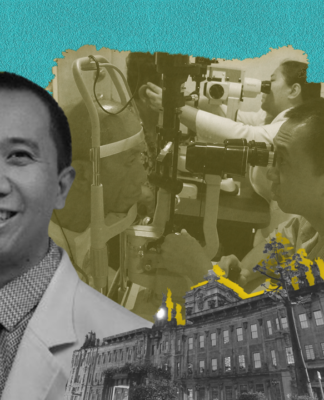NO MATTER how many times the youth fall into sin, God’s love will never fail.
Fr. Winston Cabading, O.P., UST secretary general, made this assurance before the 226 delegates of the Sinai Youth Camp 2014 last Feb. 21-22 at Phillip’s Sanctuary in Antipolo City.
Reflecting on the theme, “Kaya’t habang kayo’y humahayo, gawin ninyong alagad ko ang mga tao sa lahat ng mundo,” Cabading reminded the youth that God will always embrace His people, even if they are forgetting their duties as “God’s army.”
“Kahit ilang beses tayong madapa at magkasala, palagi tayong yayakapin ng Panginoon. Kayo, bilang mga kabataang Sinai, kayo ay napili upang mas iparamdam pa sa iba ang pagmamahal na ibinigay ng Panginoon,” Cabading said in his homily during the Eucharistic celebration.
Cabading urged young Thomasians to renew their relationship with God by forgiving their neighbors.
“Learn to forgive. You can only forgive if you have God in your hearts because before we love and get hurt by others, He first loved us.”
‘Life-changing’ experience
Cabading said the camp was a time for young people to share their religious conviction with one another.
“There is a great impact when the youth celebrates Church service with their fellow youth,” Cabading told the Varsitarian.
Girly Constantino, faculty member of the UST Institute of Religion (IR), said the camp was an effective way to encourage the youth to reconcile with God through the “work of the spirit.”
“We believe that this camp could help the youth strengthen their faith, but we believe in the work of the spirit,” Constantino said in an interview. “The real success of this camp was when the campers realized that their spirit had renewed their faith in Him.”
Miguel Ordoño III, one of the student-volunteers from the College of Architecture, described the camp as a “life-changing opportunity.”
Ordoño said the camp impressed upon him the youth’s role in spreading God’s love.
“The camp taught me the grace of living a simple life with God like what the Israelites did,” Ordoño said. “The Israelites did not need a wealthy life; all they needed was God’s love.”
Michelle Tan of the AMV- College of Accountancy, admitted her faith was “quite deteriorating” until she joined the camp.
“I was struggling with school requirements and [it seemed like] I had more time for social media than for Him,” Tan said. “But the camp is a grace from God. It renewed my faith to God by loving myself and God more.”
The 12 tribes
Sinai Youth Camp is an annual gathering hosted by the IR, offered to students taking Theology 2, known as Church and Sacraments.
During the camp, attendees were divided into 12 tribes named after the 12 sons of Jacob—Asher, Naphtali, Zebulon, Manasseh, Ephraim, Dan, Benjamin, Reuben, Judah, Simeon, Gad, and Issachar.
“Church and Sacraments is about the liturgy and prayers. We would like them to experience a sense of community, the tribes and the other forms of liturgical celebration,” Constantino said.
The bonfire, one of the highlights of the camp, renewed the attendees’ baptismal vows, following the biblical event in Mount Sinai where the Ten Commandments of God was first revealed through Moses.
The Sinai Journey, a “social learning experience” filled with obstacle courses, also served as a highlight of the camp. The obstacle courses were symbolisms of the 12 virtues of the Israelites—unity, courage, openness, hope, peace, trust, self-control, kindness, God-fearing, humility, compassion, love, and gentleness.
The Sinai Journey included crossing lagoons through ropes and “balsa,” symbolizing how the Israelites crossed the Red Sea.
Originally, Sinai Youth Camp was an in-campus activity. In 2008, the camp was held in Caleruega, Batangas. In 2010, the camp venue was transferred to Antipolo.














